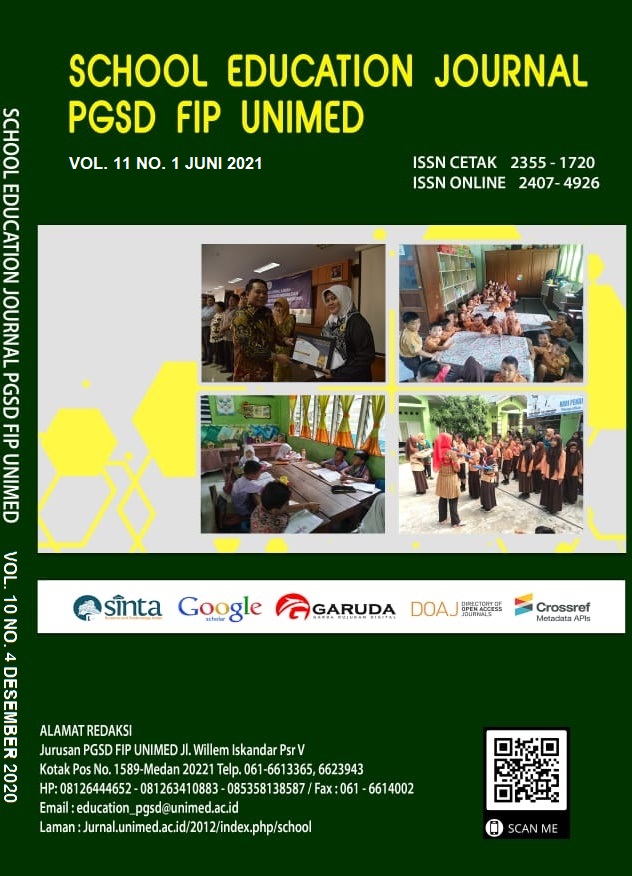HUBUNGAN ANTARA KEMAMPUAN BERKOMUNIKASI GURU TERHADAP KEAKTIFAN BELAJAR SISWA DI KECAMATAN MEDAN POLONIA
DOI:
https://doi.org/10.24114/sejpgsd.v11i1.26129Abstract
This study aims to determine the relationship between teacher communication skills and student learning activeness in Medan Polonia sub-district, 2020/2021. This research is a correlation study using a quantitative descriptive approach. The subjects in this study were 30 teachers who were taken using the sampling technique, namely purposive sampling. The data collection techniques used were documentation and questionnaire distribution. Of the 25 statement items, only 20 items were considered valid on a 4-point Likert scale. The validity of the questionnaire was obtained from two lecturers at the Faculty of Education so that the questionnaire was deemed appropriate to be used as a research instrument. As the criteria for the variable of teacher communication skills and student learning activeness using the Likert scale. If p> 0.05, the distribution is declared normal, on the contrary, if p <0.05, the distribution is declared abnormal. The correlation results where rxy = 0.667 with significant p = 0.000 <0.050. This means that the hypothesis proposed, the stronger the teacher's communication skills, the higher the student's learning activeness is accepted. The result of the determinant coefficient (r2) of the relationship between the independent variable X and the dependent variable Y is (r2) = 0.445. This shows that the teacher's communication skills contribute to the active learning of students by 44.5%. From these results it is known that there are still 55.5% of the roles of various other factors that influence student learning activeness. Keywords: Student learning activeness, Teacher Communication.References
Ahmadi, Abu. 2012. Psikologi Belajar. Jakarta: Rineka Cipta.
Aunurrahman. 2012. Belajar dan Pembelajaran. Bandung: Alfabeta.
Brent, D. Ruben dan Lea P. Stewart. 2013. Komunikasi dan Perilaku Manusia. Jakarta: PT Raja Grafindo Persada.
Effendy, Onong Uchjana. 2018. Ilmu, Teori Dan Filsafat Komunikasi. Bandung: PT Citra Adiya Bakti.
Halimatussakdiah & Mahasiswa Prodi PGSD C1 Reguler FIP Unimed. 2017. Peningkatan Keterampilan Berbahasa Indonesia Pada Mahasiswa PGSD. Medan: Unimed Press.
Majid, Abdul. 2014. Strategi Pembelajaran. Bandung: Remaja Rosdakarya.
Mulyasa E. 2009. Standar Kompetensi dan Seryifikasi Guru. Bandung: PT Remaja Rosdakarya.
Mulyana, Deddy. 2009. Ilmu Komunikasi Suatu Pengantar. Bandung : Remaja Rosdakaraya.
Nofrion. 2018. Komunikasi Pendidikan Penerapan Teori dan Konsep Komunikasi Dalam Pembelajaran. Jakarta: PrenadaMedia Group.
Rusno. 2011. Faktor-Faktor Yang Mempengaruhi Keaktifan Mahasiswa Dalam Proses Pembelajaran Mahasiswa Program Studi Akutansi Universitas Kanjuruhan Malang Tahun 2011. Jurnal Inspirasi Pendidikan Universitas Kanjuruhan Malang.
Sanjaya, Wina. 2014. Media Komunikasi Pembelajaran. Jakarta : Kencana Prenada Media Group.
Sardiman. 1996. Interaksi dan Motivasi Belajar Mengajar. Jakarta: Raja Grafindo Persada.
Sardiman, A.M. 2001. Interaksi dan Motivasi Belajar Mengajar. Jakarta: Radjawali Persada.
Sardiman, A.M. 2011. Interaksi dan Motivasi Belajar Mengajar. Jakarta: RajaGrafindo Persada.
Siregar, Eveline,Hartini Nara. 2010. Teori Belajar dan Pembelajaran. Bogor: Graha Indonesia.
Sitorus, Masganti. 2011. Metodologi Penelitian. Jakarta: Kencana.
Sudjana, Nana. 2003. Dasar-Dasar Interaksi Belajar Mengajar. Bandung: Sinar Baru Algesindo.
Sudjana, Nana. 2015. Dasar-Dasar Proses Belajar Mengajar . Bandung: Sinar Baru Algesindo.
Sugiyono. 2010. Metode Penelitian Pendidikan. Bandung: Alfabeta Indonesia.
Sugiyono. 2013. Metode Penelitian Pendidikan. Bandung: Alfabeta Indonesia.
Sugiyono. 2016. Metode Penelitian Pendidikan : Pendekatan Kuantitatif. Kualitatif dan R & D Bandung : Alfabeta
Sutikno, Sobry. 2013. Belajar Dan Pembelajaran. Lombok: Holistica.
Downloads
Published
Issue
Section
License
Authors whose manuscripts are approved are approved as follows:
The publication rights for all journal manuscript materials published/published on the SEJ (School Education Journal) E-Journal site are held by the editorial board with the author's knowledge (moral rights remain with the manuscript authors).
The formal legal requirements for accessing this electronic digital journal article are subject to the terms of the Creative Commons Attribution-ShareAlike (CC BY) license, which means that E-Journal SEJ (School Education Journal) has the right to store, transfer media/format, manage in the form of a database, maintain, and publish articles without asking permission from the author as long as the author's name remains as the copyright owner.
Manuscripts published/published electronically are open access for educational, research, and library purposes.

